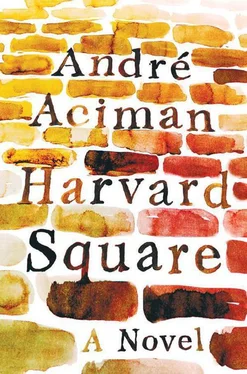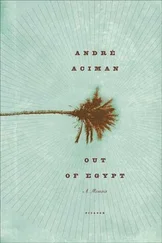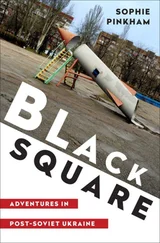Weeks went by without more than a couple of phone calls. Things were cooling off between us, and perhaps it was better this way, I thought. I was working very hard, knowing that I had slightly more than a month before the dreaded date. There were a few parties to go to. At their early winter get-together, Mrs. Lloyd-Greville took me to “our intimate little corner” at their house where we bandied mock-flirtatious quips. Mrs. Cherbakoff continued to ask about my parents’ health, both to find out if they were still alive and if I planned to pass my exams so that they could continue breathing a while longer. And there were the usual pre-Christmas student parties, to which normal protocol required you bring either a bottle of red or a wedge of Brie.
After the third pre-holiday party, I woke up at night with another attack of gallstones. There had been no warning whatsoever, but this was far worse than the previous two. I could hardly stand up, felt nauseous, and when I finally touched my forehead, knew I had a fever. I dialed Kalaj’s most recent phone number, but the woman who picked up the phone hadn’t seen him in quite a while and said she hoped he’d drop dead.
“I am his friend,” I said.
“And so was I, whoop-dee-doo! Drop dead too.”
“I need to be taken to the emergency room,” I said.
She came to pick me up fifteen minutes later and drove me to the same infirmary. Brunette, curly hair, made and sold her own jewelry, parents lived on the Upper East Side, and, yes, twice a week, when I asked if she was seeing a shrink. I never saw her again.
After walking into the emergency room, I found the familiar gurney, the placid English nurse, the same young doctor who’d been called in for me and who still showed signs of wetness from his 4:00 a.m. shower. Two days later I was operated on and had my gallbladder removed. At the infirmary, as had become routine by then, my room was continuously mobbed. Students and professors dropped in, including Lloyd-Greville, husband and wife, and Cherbakoff, husband and wife. Frank and Nora came together and left together, as did Niloufar, who came, as one does at a funeral, with one flower ready to be tossed at the tombstone of the deceased. Unannounced, even Young Hemingway stopped by. Six months later, in fact, we became good friends. But Kalaj never came, though he must have known, since Zeinab came to see me every day, sometimes twice. I kept fearing he might show up, all the while another part of me wished that he would and that he’d be the last to leave so that we might crack jokes at the expense of all those who had come with kindness in their nectarosyrupy hearts. I would have loved nothing more than to see him tell Lloyd-Greville’s wife, as I’d heard him tell a woman who complained he never helped her achieve orgasm, that she should treasure the memory of her last orgasm, since it probably predated the French Revolution. But having him stand elbow to elbow with my examiner would have been madness, and the last thing Kalaj may have wanted was to run into his old students. Actually, I didn’t want him to run into anyone I knew. I wanted my partitions back up.
Allison had heard about my operation but did not come. Instead she sent me a lavish bouquet of flowers. “I don’t need to say it — my feelings haven’t changed. Please get well. A.”
I wanted to call her on the spot and ask her to come see me right now, even if it was past visiting hours. I wanted her to stay up with me all night and hold my hand over the blanket until, with morphine, the pain subsided and I fell asleep. She’d do anything for me, as I knew I would for her. But I didn’t trust myself, didn’t trust my love, didn’t trust my own promises, much less those who trusted them. Just the memory of how she’d barged into my life and lain down on my carpet and read through my diary without paying me any heed could stir up something like love for her. But it was not love, just love-like. Something in me had withered; soon it would wither in her too. Right now I remained a mystery to her; but this mystery was precisely what stood between us. She was drawn to the foreign inflection in everything I did, thought, and said. Soon she’d spot the bruise behind the inflection. I blamed her for not seeing the bruise so I wouldn’t be blamed for hiding it from her.
THE FIRST PLACE I went when they let me out ten days later was Café Algiers. No one had seen Kalaj in days, I was told. Nor was he anywhere to be seen at the Harvest, or at Casablanca, or downstairs at Césarion’s. When I asked if they had his number, the only number they gave me was my own. I decided to go home. But home, when I got there, was too stultifying; it reminded me of the loneliness I had managed to put behind me ever since meeting Kalaj and that I was convinced was a thing of the past now. There was no one to call. I missed Allison. I missed Ekaterina. Missed Niloufar. Even Linda would have been welcome. Everything felt soulless. By nighttime I began to miss the hasty patter of footsteps of the night nurses. I went back to Café Algiers, a ten-minute walk. Kalaj saw me before I so much as started to look for him. Actually, he was yelling at me. “Are you out of your mind, are you crazy?” He seemed in a panic. “You should be in bed.” Zeinab, who was nursing a drink between Kalaj and a young Moroccan cabdriver I’d seen only once before, took one look at me and said I should sit down right away. “You’re all white. You’re going to faint.” They brought me a glass of soda water which Kalaj forced me to drink, all the while sprinkling my face with drops from a piece of melting ice. For a moment I felt like a wounded Victor Laszlo stumbling into Rick’s Café Américain in Casablanca and being bandaged by staunch and loyal partisans.
I had not seen Kalaj in weeks. He seemed changed.
“Are you all right?” he asked.
“I am all right. And you?”
“Could be better.”
Typical strains of veiled sorrow fringing self-pity.
“They took my license away and will never renew it. The FBI. I had to sell the car.”
“We’re going to have to see your lawyer.”
“You know as well as I do that he is a crook. He’ll end up costing more than the car.”
“But you can’t just let them take your car away without trying to do something about it.”
Léonie’s boss had a lawyer friend who might be asked to help. Except that Léonie felt that her ex-lover hadn’t forgiven Kalaj, and might be happier having him totally out of the way.
“And the Freemasons?” I asked.
“The Freemasons, well, we’ll see about the Freemasons.”
Silence.
“And if these don’t work, well, all of you in this bar right now — and that includes you too, Zeinab — will say that the last Checker cab in Boston was driven by a pure Berber who was proud of his skin and proud of his friends.”
Kalaj was in top form.
“If I had a car I’d drive you home right this instant.”
“I’ll take him if he wants,” said the young Moroccan cabdriver.
“How many times do I have to teach you,” said Kalaj, reprimanding the cabdriver who was more my age than Kalaj’s. “Never say ‘if he wants’ with this kind of honeyed, ersatz tone in your voice. Instead, say, ‘I’m taking you home. Let’s go.’ ”
“Well,” said the shy Moroccan, “should we go?”
Everyone laughed.
“They said I could drink if I wanted,” I insisted.
“They said you should go home,” said Kalaj, as patronizing as ever.
I knew that he cared for me. But I could also tell that he was holding a grudge and had finally seen through all of my wiles. A chill seemed lodged between us, and although I’d long wished for it, I hated seeing how easily it had settled, as though reclaiming what had all along been its rightful place.
Читать дальше












